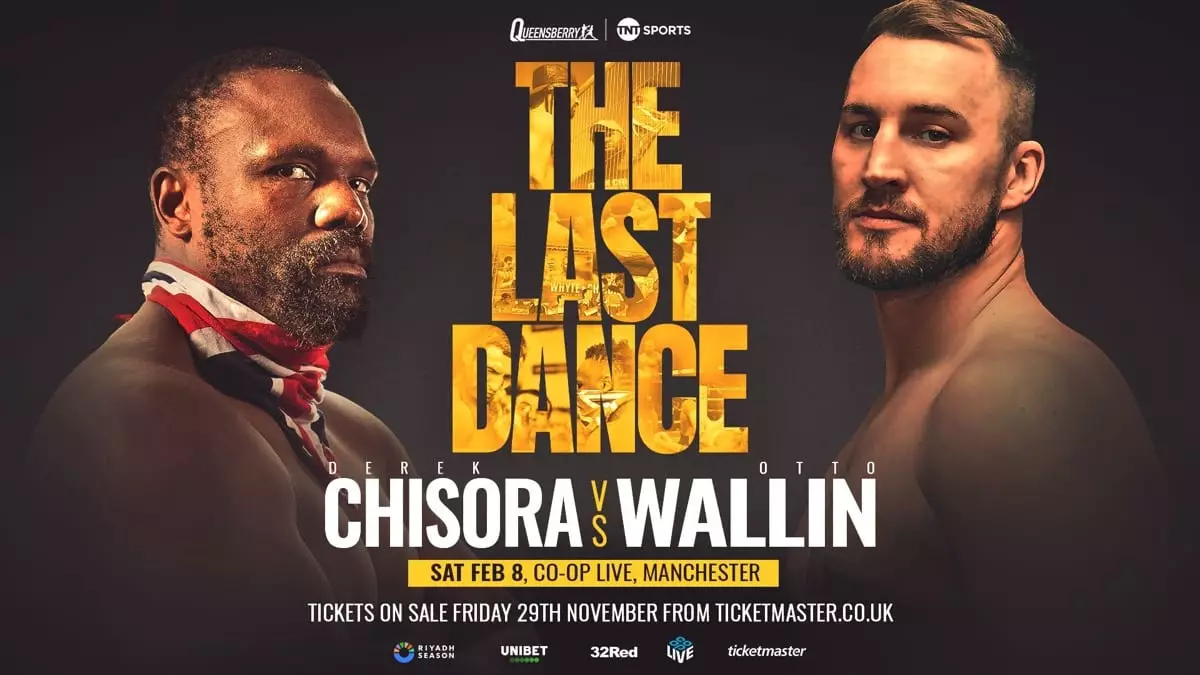Derek Chisora, a name synonymous with British heavyweight boxing, steps into the ring once again, this time against Otto Wallin in a much-anticipated clash scheduled for February 8 at Manchester’s Co-op Live Arena. At 40 years of age, Chisora’s persistence in the ring has drawn mixed reactions from fight enthusiasts and critics alike. While some admire his undying spirit and commitment to the sport, others argue that it is time for him to retire. This sentiment is echoed by his recent underwhelming performances and statistics that seem detrimental in a sport that is evolving rapidly with younger talent.
Chisora, with a professional record of 35 wins and 13 losses, is not without his achievements, including 23 victories by knockout. However, it is concerning that his last legitimate win against a top-tier heavyweight was over six years ago when he faced Carlos Takam. Since then, Chisora’s victories have been against opponents who were either nearing the end of their careers or not in their prime. This raises questions about the integrity of the sport and whether Chisora’s continued fight placements are genuinely competitive or more of a recurring spectacle.
The physical demands of heavyweight boxing are immense, and the consequences of age cannot be overstated. Watching Chisora fight can sometimes evoke feelings of nostalgia but quickly turns to concern as he appears increasingly unable to compete at the level required for such high-stakes bouts. His unique fighting style, once characterized by aggression and tenacity, now reflects a certain weariness. Observers note that he resembles a “rusty tin man,” unable to evade punishment with agility and speed.
In the wake of disappointing performances, his promoter still insists on giving him headliner status, which can often frustrate fans hoping to see more dynamic and promising competitors take center stage. The situation generates considerable debate around the ethics of allowing a fighter with so many losses to consistently headline marquee events. With all the allure surrounding big-time boxing matches, there is a growing need for fresh, younger fighters to have opportunities to shine.
The Tough Matchup Against Wallin
Chisora was originally scheduled to face Jarrell Miller, a matchup that many believed would favor the seasoned fighter. Miller, now an irrelevant figure due to issues stemming from promotional disputes, was replaced by the younger and technically skilled Otto Wallin, who boasts a record of 27 wins and only 2 losses. Wallin is strategically a challenging opponent for Chisora. Standing at 6’5 ½”, the Swedish boxer presents a distinct reach and physical advantage, combined with a refined skill set, making this bout particularly tough for the 40-year-old veteran.
Chisora himself acknowledged the heightened difficulty of this fight, admitting, “It’s more difficult. It’s a harder fight.” Such statements provide insights into his mindset; he seems aware that his days of tanking through fights are numbered and that this upcoming match could serve as an ultimate test of his mettle. Despite his reservations, Chisora remains adamantly optimistic about his capabilities, expressing confidence in achieving victory against Wallin.
As the boxing world turns its attention to this intriguing matchup, a dialogue is emerging around Chisora’s career path. The desire to reach a milestone of 50 fights is palpable, yet one must wonder if the journey to such a number holds merit if it sacrifices the competitive nature of the sport. Chisora’s aspirations might mirror those who have fought hard and long, yet the time may be ripe for him to reassess his future in the ring.
Heavyweight boxing is becoming increasingly competitive and youthful, with strong contenders emerging from various corners of the globe. As fans tune in to watch this upcoming spectacle, the fate of Derek Chisora hangs in the balance, and the question remains: will this legendary fighter continue to defy the odds, or will he ultimately pose more danger than entertainment? The answer may very well set the tone for his legacy and the ever-evolving landscape of heavyweight boxing itself.

